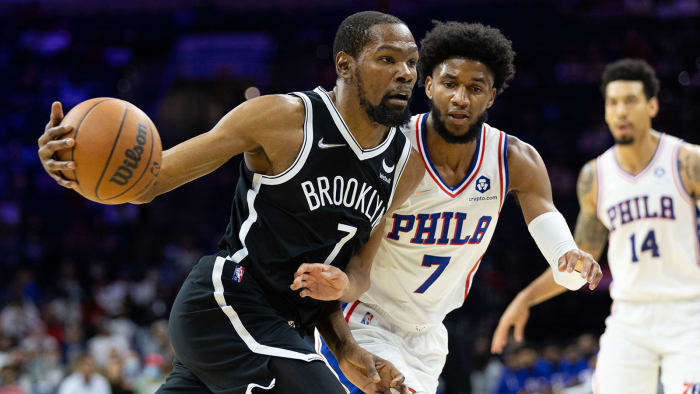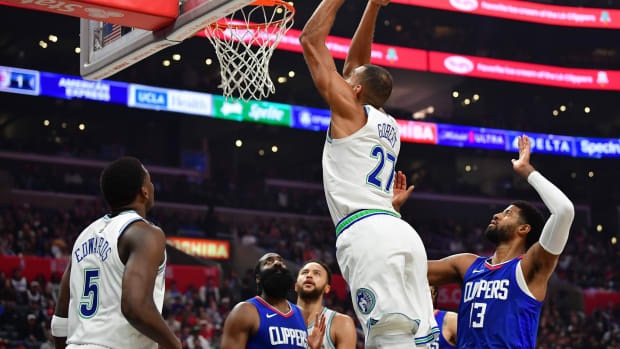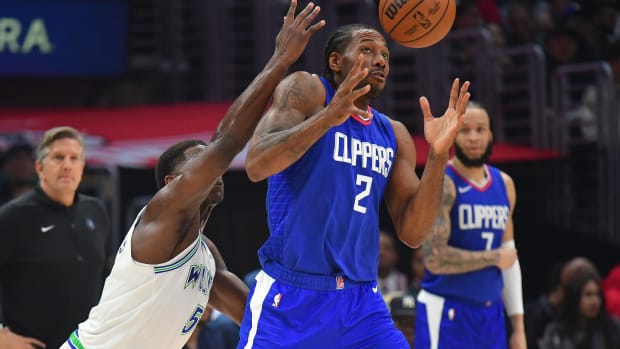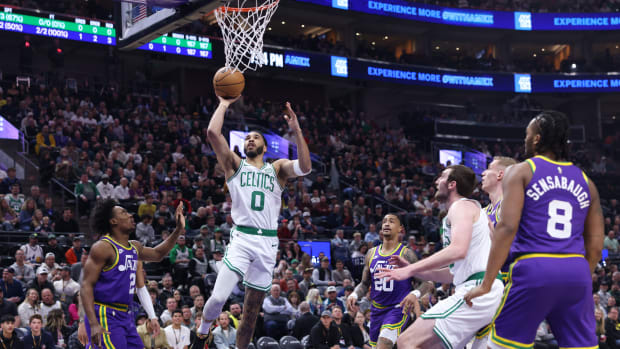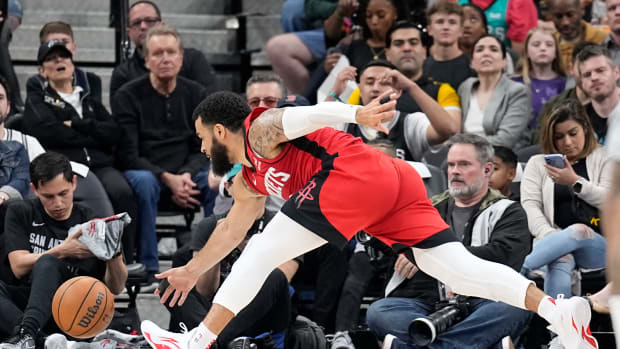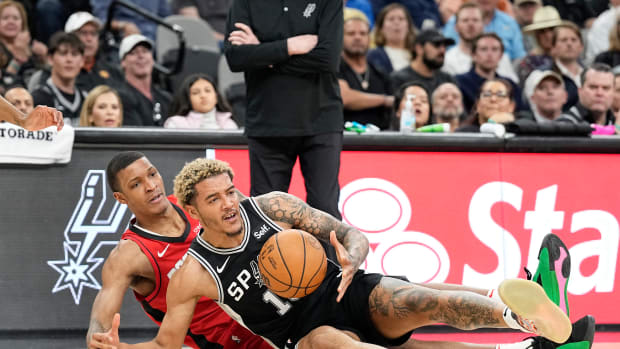Without Kyrie Irving, Nets’ Future Is Anything But Certain
Kyrie Irving will not play basketball this season unless one of three things take place: a) he complies with New York City’s indoor vaccination mandate, b) the city’s mandate is lifted or changed before July or c) the Nets trade him. Before one of those three scenarios is realized, Irving won’t be allowed inside Barclays Center, and the Nets won’t let him “participate with part-time availability,” per a statement from the organization that was released Tuesday morning.
A conversation about anti-vaccine postulation during a pandemic is more important than any sports-related story line. But setting that reality to the side and acknowledging another, Irving happens to be a 29-year-old star employed by a heavy title favorite. The relevance of his absence is heightened through the lens of Brooklyn’s championship chase, turning the question of whether they can win it all without him into this NBA season’s most scrutinized and pivotal debate.
On paper, the 2021–22 Nets are an improved version of what we saw in '20–21, when they finished with the best offense in NBA history despite having their three All-Stars play only 202 minutes at the same time. They were up 3–2 in the second round before losing Game 7 against the Bucks in an overtime classic. Irving was sidelined by a sprained ankle that night, while James Harden played 53 minutes on a partially torn hamstring. It’s reasonable to believe the Nets would’ve advanced had one of them been healthy.
Now, in addition to re-signing Blake Griffin and Bruce Brown, drafting Cam Thomas (who’s already an absurd shotmaker), bringing back LaMarcus Aldridge and benefiting from an actual training camp, the Nets essentially swapped Jeff Green, Tyler Johnson, Landry Shamet and DeAndre Jordan for Patty Mills, Paul Millsap, James Johnson, DeAndre’ Bembry and Jevon Carter.
They’re deeper, more versatile and more defensive-minded than before, with complementary pieces who fit in lineups that are adaptable for the postseason. But as is the case anytime a contender shakes up the glut of its rotation and then loses someone who averaged 27 points and six assists with 50/40/90 shooting splits the year before, there’s a degree of unknown.
Every new face, along with those who competed last season, will have more to do so long as Irving is unable to produce. Nash’s starting five is where the speculation begins. Mills can slide in as a starting point guard and that unit might actually improve, with a sharp-shooting veteran (Mills made 41.4% and 43.5% of his wide-open threes the past two seasons, respectively) who doesn’t need the ball and is consistently engaged on every defensive possession.
Or, speaking of defense, Nash could go with Carter, an interminable on-ball pest who so far leads the Nets in preseason minutes (while also shooting 9-for-15 behind the arc). Maybe Bembry gets a look, if for no other reason than the Nets want more size without sacrificing the number of ballhandlers they’ll have on the floor.
The last option is the most likely: Nash puts the ball in Harden’s hands, letting him function as the Nets’ primary playmaker with Joe Harris, Kevin Durant and two of Brown, Aldridge, Griffin, Johnson or Millsap in the frontcourt.
This brings us to the next question: With Irving no longer around, how much time will Harden and Durant spend side by side? Does Nash stagger or maximize their time together, possibly allowing all-bench units that feature two or three former All-Stars to do battle on their own? For the sake of argument, suppose the Nets start Nic Claxton and Griffin with Harden, Durant and Harris. If Nash stretches his rotation, Mills, Thomas, Brown, Aldridge and Millsap could compete as their own formidable group against opposing second units. Injuries and rest will shake these hypotheticals up, but the lack of specificity can be seen as beneficial. Too many permutations are better than none at all.
Splitting Durant and Harden up is another option, though it’d require a change to how their regular stints mostly looked last year. This relates to Brooklyn’s broader attitude toward minutes, rest and load management, all knowing Harden and Durant’s ability to perform in peak condition during the playoffs is what really matters. Still, a balance must be struck. The Eastern Conference is stacked at the top, with the Bucks, Heat, Sixers, Hawks, Celtics and Knicks all believing they’re good enough to finish with home court advantage. The Hornets, Pacers, Bulls and Wizards won’t be pushovers, either. The Nets are talented enough to finish with the best record in the conference, let alone a top-four seed, but assuming they prioritize health over the standings, where they end up is far less certain than had Irving been available.
Outside of the very real possibility Harden or Durant get hurt, the playoffs are a different matter. In that setting, Irving’s mesmerizing talent is more decorative ornament than vital ingredient. That context shifts if Harden pulls his hamstring or Durant strains his quad at the worst possible time, but with those two on the court there isn’t a defense in existence that can handle the Nets in crunch time. (Their offensive rating as a pair was a volcanic 122.1 during the regular season. In the postseason it was 122.0.)
Throw Irving into the mix and this team is almost battling history instead of 29 other teams. Could they go 74–8? Would they push their record-setting attack to an even higher efficiency? Is anybody taking even a single game from them in a seven-game series? Those Nets might have been the most unbeatable roster ever assembled, with boatloads of experience and skill off the bench, along with the added motivation of last year’s disappointment spurring them on.
For now, Irving’s decision not to receive a life-saving vaccination foils that possibility, and instead, this team faces a tangible margin for error. It’s not wide enough to keep Brooklyn from winning it all, or even being considered the favorite to do so, but its path there may be far more convoluted than it’d otherwise be.
More NBA Coverage:
- Nets Had No Other Choice With Kyrie Irving
- No, the Vaccine Is Not a Personal Choice for NBA Players
- Kyrie Could Derail Nets Championship Run
- Karl-Anthony Towns Opens Up About Season of Grief
- Trae Young Is the Hawks' Torchbearer






























